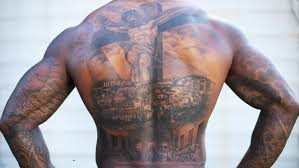Thanks to all who voted so far in the poll!
NB: If you have not yet voted in the poll, please vote now! :)
NB: If you have not yet voted in the poll, please vote now! :)
Welcome to Christian Forums, a Christian Forum that recognizes that all Christians are a work in progress.
You will need to register to be able to join in fellowship with Christians all over the world.
We hope to see you as a part of our community soon and God Bless!
@OzSpen Looks like a great John 3.16 tattoo there. My wife and I talked to a young lady with the whole of John 3.16 tattooed on her wrist area (possibly a better placement for a woman with a John 3.16 tattoo than for a man wanting one on his chest).Done!
Gospel related tattoos have been used effectively by the south-sea Islanders who play in the Rugby League competition in Australia. He is an example of one player, formerly playing in Australia but now in the UK:
St Helen’s (UK) wrote of Naiqama: ‘The religious scriptures inked across the chest of St Helens’ new signing Kevin Naiqama are passages from John 3:16 and Romans 10:9, passages which identify one’s faith in Jesus’ (Kevin Naiqama: My God My Land).

(Kevin Nyiquama, John 3:16 tattooed on chest, courtesy couriermail.com.au)

Kevin Nyiquama, tattoo of crucifixion and Last Supper on his back, courtesy dailytelegraph.com.au)
Oz
@Heart2Soul In some ways I wish more Christians worked in tattoo parlors. (Don't you?)I have met some who had tattoos before getting saved and someone asks about it he begins to share his testimony of who he was when he got that and who he is now.
It can work either way.
@Candidus My wife and I talked to a young lady with the whole of John 3.16 tattooed on her wrist area; it was her favorite Bible verse and mine also; and I'm sure other conversations have arisen as a result of her willingness to become a parlor client in this way.I don't care what tattoo one gets, it spells out "Bad Judgement" to me. It cannot add to your "witness."
When I see a tattoo I shallowness, a "me too" weak-mindedness. In the military I saw others get unit tattoos because of peer-pressure and "me too", or got drunk and did something stupid. (my favorite were the guys sporting a tattoo in Korean they said was translated "brave and courageous" when it actually meant "Moron and stupid")! I understand in the case of the military some are motivated by esprit de corps. Most retired military men with their blotchy, shriveled-up tattoo regret it. That cute butterfly on a woman's cleavage will look like a vulture in 40 years! I have seen excessively obese women get tattoos as if they somehow believed that people will look at the "ink art" and not see that they are excessively fat. Sorry, it only brings attention to you and exaggerates and amplifies their weight issue!
Therefore, any tattoo is a negative witness in my mind.
That cute butterfly ...
@Candidus You might not be sympathetic — I think you may be speaking ironically here — but in terms of what it denotes it has a lot of meaning as a symbol; whether or not the pigment fades without ink touch ups after several years, its meaning abides, FYI:
"Butterfly tattoos are a very popular choice for both men and women, though they are a bit more popular with women. They can be used to symbolize rebirth, love, transformation, grace, nature, or femininity. .. The transformation symbolism is easy to detect as butterflies start their lives as caterpillars and after undergoing a process called metamorphosis emerge anew as beautiful winged creatures. This can also be considered a rebirth. .. The butterfly can also remind us to keep our faith or keep moving while we undergo transitions in our lives. This is the type of butterfly tattoo meaning that can be used by both sexes equally. .. The origination of the idea of a butterfly representing love comes from the Balkan Peninsula. In Greek the word butterfly is known as psyche .. The word psyche translates to “soul” thus further linking the butterfly to humans. .. The butterfly is not usually seen as a religious tattoo, but religious meanings can certainly be used. .. The meaning can change with butterfly tattoos depending on their placement on the body. For example, when placed on the shoulder blade it represents the dreamer whose head is in the clouds; on the chest it can mean unconditional love .. and on the lower back can signify stability, survival, and trust. If you care a lot about your tattoos’ meanings, then you will definitely want to think long and hard about where you want to place your butterfly tattoo. When placed properly, you can have five or six meanings that work .. ." tattooseo dot com
@Candidus Thanks for your various comments; your participation is appreciated.Symbols are useful in culture. Symbols in art were used to convey truths to the viewers, most of whom were illiterate. The symbols gave meaning to the paintings.
It is questionable as to whether our bodies should be a canvass. Scrawling Bible verses on our skin is not Scriptural;
"Do not cut your bodies for the dead or put tattoo marks on yourselves. I am the LORD." Leviticus 19:28
While not mentioned in the New Testament, there does exist a prohibition in the Old Testament. Silence in the New however, is not an endorsement. Using Scripture in a tattoo does not sanctify or sanction it.
Good general point to remember, indeed.I agree with Peter that there is much to worry about in our spirit, our character, our Christian witness, that the world’s concept of trend and beauty in external things is not what should draw people to us, but that inward beauty.
It's not really about feeling really good (though that too) but about the conviction that the message conveyed from Scripture is one that is blessed. In this way, a lot of Christians go boldly to the parlor thrilled that their earnestly desired inking perforations - via some pain - will be potentially used in blessing.Those who get scripture must be overjoyed. The money and pain are outweighed by the message they witness to . .. I see it a great tool for starting a conversation and planting seeds. :)
@Candidus Thanks for your various comments; your participation is appreciated.
The same chapter - the adjacent verse - seems to say about not trimming one's beard; do preachers shave? if they so, they are maybe admitting that dispensationally they are not Old Testament Jews in the land under the law, but instead New Testament believers under grace for whom the Gospel (which might involve witness means that manifestly are effective) is the rule of the believer's life, rather than the law.
@Candidus Some good points there; your response is very thoughtful.You are correct that the passage in Leviticus prohibits tightly-shaved haircuts and trimming the beard. Certainly different than what most 20th century Christians imaged as the ideal "clean-looking Christian" man! The admitted difficulty of tattoos being paired in this verse with beard trimming raises a problem, can one admit that there is a vast difference between a temporary setback in hair follicles and permanently marking the body with scars or tattoos is a bit more drastic?
Ironically, your response to those that judge someone's Christianity and people's salvation on the issue, is the same as mine. I point to their short haircut and shaved faces and ask what's wrong with that picture!(I get a bit snarky when they comment on my recent haircut... I just tell them that I had to do it to get my salvation back!) :)
"Shall we sin because we are under grace"?
I am not saying that in the New Testament tattoos are labeled as "sins" per se, but that by the virtue of there not being a direct statement on the issue, does not make such a thing as neutral or an innocuous freedom. Not all things are prohibited, and not all things are profitable. Is it of the World, or is it of Faith?
Wife beating is never addressed in the New Testament, yet we know that it does not express love and give off a good witness. Using Bible pages in the prisons for rolling papers, does not sanctify the act. There is no Law prohibiting using pages from the Bible in that manner. Why would we really want to do what we do, especially when their is no command to do it, or not do it? What is really our driving motive?
So, when it comes to things not mentioned in Scripture, the question I ask myself is, is it profitable? Concerning inking myself, is it positively "Christian"? Or is the real question I should ask is if this popular trend is positively "Worldly"? We should be seeking God's will for our lives, not what is "neutral."
"It is better not to eat meat or drink wine or to do anything else that will cause your brother or sister to fall. So whatever you believe about these things keep between yourself and God. Blessed is the one who does not condemn himself by what he approves. But whoever has doubts is condemned if they eat, because their eating is not from faith; and everything that does not come from faith is sin." Romans 14:21-23.
Getting a tattoo is a personal thing. Your conscience is not my conscience; and whatever my conscience on an issue is.., really has no bearing on yours. It is between you and God. I would just recommend that we all weigh our motives and pray for God's direction in what many consider as "doubtful things," and that we do with those things, not because we are free, not because it gains us worldly acceptance and praise, but whether by faith, God approves and is telling you to do it.
@Candidus
My wife and I talked to a young lady with the whole of John 3.16 tattooed on her wrist area; it was her favorite Bible verse and mine also; it evidently worked to cause our conversation as I'm sure for other conversations and I'm guessing in her mind such conversations that arise would strongly vindicate to her - if not to other Christians with different outlooks - her past evidently deliberately strong commitment to undergo the injection of all those words in a parlor, a commitment that she would not have entered into lightly.
I am just saying that commitment to endure pain is not "taking up your Cross" or sacrificing for God. Enduring pain for the sake of pleasure is common, not remarkable or a definite sign of faith. It is great that this lady used the tattoo as a means to witness. But the question we really want to know is, did she pray about getting it? Did she evaluate Scripture when doing it? Did she care what the Jewish and Christian tradition said? Was it all about God and nothing of her? Did God give her definite direction to do this?

